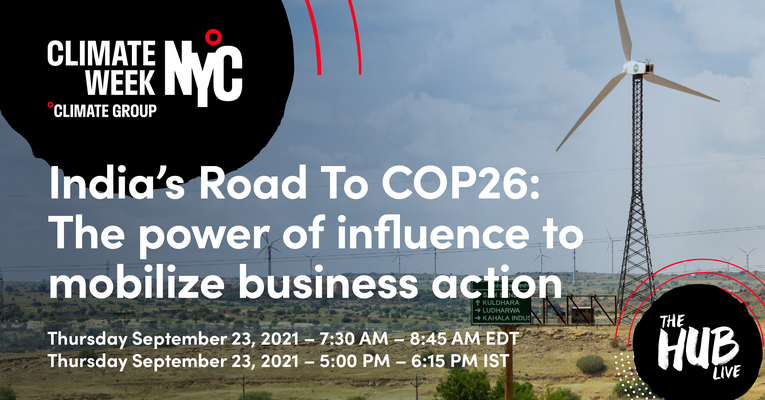Influencers from India’s government, industry and society came together at an online event this week to discuss the country’s progress on green issues. Held in advance of the upcoming COP26, the Climate Week NYC session looked at how India can decarbonize industry and drive take-up of renewable energy and electric vehicles.
As the world’s third-largest emitter of carbon dioxide, India is well placed to play a leading role in combating the climate crisis. Consequently, the country has set ambitious goals to mitigate the impacts of climate change, including committing to a target of 450 gigawatts of renewable energy by 2030.
Businesses across the nation must join the fight
COP26 Regional Ambassador for Asia-Pacific and South Asia Ken O’Flaherty said that business can play in role in achieving change. “Businesses across India can help by advocating for increased product efficiency for high-energy products, whether that's motors, refrigerators, air conditioners or lighting,” he explained. He also urged Indian businesses to join Climate Group’s RE100, EV100 and EP100 initiatives, and to sign up for Race to Zero ahead of COP26.
Sub-national governments can lead the way
The state of Maharashtra is showing how sub-national governments can help promote green technologies. “In terms of the footprint that Maharashtra has in industrialization, population and size, we realize the role we can play as a state, as a sub-national government, on climate action," said Aaditya Thackeray, Minister of Tourism and Environment for the Government of Maharashtra.
To reduce carbon emissions, Maharashtra has partnered with EV100 and aims to achieve 45% of public transport by electric vehicles by 2025. For everyday users, it plans to increase the number of EV charging stations, and to boost green energy production to power them.
In all, the state aims to produce 25% of its energy needs from renewables by 2025. Maharashtra is also a member of the Under2 Coalition.
Changing business culture will be vital to mobilizing enterprise
Indian business culture is also evolving to fight climate change. To date, 25 India-headquartered companies have committed to Climate Group's business-focused initiatives, including RE100, EP100 and EV100. And more pledges are on the way.
Among these, UltraTech Cement Limited is joining the RE100 initiative. The company is committing to sourcing all of its electricity requirements from renewables by 2050. “It is an ambitious target,” said Raj Narayanan, Chief Manufacturing Officer and Business Head at UltraTech, “but we are confident we'll be able to achieve it by 2050.”
Progress so far has been good, he said. “In the last five years, renewables have grown three times. India is now the fourth-largest renewable player in the world.” To help, the Indian government is bringing in policies that will make it easier to adopt green technologies.
Sustainability in the building industry depends on a motivated workforce
Vinod Rohira, CEO at Mindspace Business Parks REIT, stressed the importance of sustainability in the building industry. “We have to develop the culture within organizations, with newer, younger people getting into the workforce,” he explained. “They need to adapt to this really quickly and make it their primary agenda.”
Cooperation from all stakeholders is key
At the heart of this culture change is cooperation, as Seema Arora, Deputy Director General for the Confederation of Indian Industry (CII), pointed out. "CII brings together all the stakeholders. It's not just one company which can make that commitment and achieve it,” she noted. “It's the entire value chain.”
Promises alone won’t fund change
But the move to greener tech does not come cheap. Access to the necessary financing is crucial. Developed nations need to fulfil their commitments to help other countries, including India, make the necessary investment.
Prashant Jain, Joint MD and CEO, JSW Energy, pointed out that developed countries have not met their COP16 promise to provide $100 billion in funding by 2020. “I think that commitment should be a focus point in the COP26 meeting,” he stated. “The availability of this kind of funding is critical for [these] projects.”
Influencers from many sectors can advocate for change
Indian Actor and Founder of Climate Warrior, Bhumi Pednekar stressed the part influencers can play in promoting change. “I think the role is one that can be very, very impactful,” she said. “If we put all our tools together into bringing about a positive change highlighting the climate crisis we are in…I think we can make a huge impact.”
